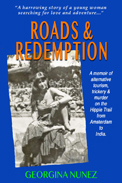
 |
At eighteen, having just graduated high school, Nunez embarks on a soul-searching bus trip to Nepal and India, hoping to escape her dysfunctional family. The narrative takes place in 1972 during the height of the hippie culture. Nunez is a responsible teenager who has saved up for what is meant to be a stirring adventure full of revelations and discovery. Though the stage is set perfectly for Nunez's memoir to follow the prototype of a coming-of-age story, it doesn’t take long for the story to embark on a treacherous path that truly becomes a battle for survival at every turn.
From the onset, audiences grieve for the childhood that Nunez missed. As a victim of repeated sexual abuse by her mother’s boyfriend, Dirk, the author’s feelings of liberation are nothing short of cathartic. From Athens, Greece to Goa, India, the world awaited her, and despite a twinge of guilt for not telling her mother, Nunez was ready to rise to the occasion.
Nunez is in the company of her boyfriend, Ide—a leech when it comes to money—and Jan, a Dutchman who is also on the tour bus with them. When their adventure leads them to the Blue Mosque in Istanbul, Nunez is not allowed to go in due to not having a headscarf. Not long after, she runs into Charles Sobhraj, and the entire outlook of her life is turned on its head. Desperation can deceive the mind. Nunez is fresh out of funds and is in the presence of a seeming gentleman who wants to pay her for her company while he wines and dines his clients on his business dinners. She doesn’t see the red flags: the exclusive six-month commitment, the requirement to have no contact with friends and family, and the surrendering of her passport.
Visions of the beaches in Goa turn into Lahore, Pakistan, with Nunez at the mercy of Sobhraj and his henchman. To Sobhraj, death is nothing more than a game, and his treatment of an innocent taxi driver jolts Nunez awake to the need to be on high alert. The frenetic pace alludes to the heart-stopping tension that the author is enduring while facing the uncertainty of the fate Sobhraj has in store for her. Unfortunately for Nunez, it gets worse before it gets better, testing her resolve against every betrayal. Her attempts to escape from the devil, Sobhraj, land her in an equally dark hell. Regardless, Nunez remains undeterred to live out her purpose, whether that is breaking free from the political prison she finds herself in, or resuming her journey to India.
The raw authenticity with which Nunez delivers her story is mind-boggling. To relive that experience in any capacity must be torturous in and of itself. Yet, her memoir speaks to the way Nunez lives her life—living her truth in every moment. Never containing a dull moment, Nunez’s work is often both heartbreaking and stirring. It is heartbreaking to know that the author had to endure what she endured, but it is stirring to see the ferocity of her inner spirit that would simply not let her stay down. Nunez has crafted a thoroughly electrifying read.
RECOMMENDED by the US Review